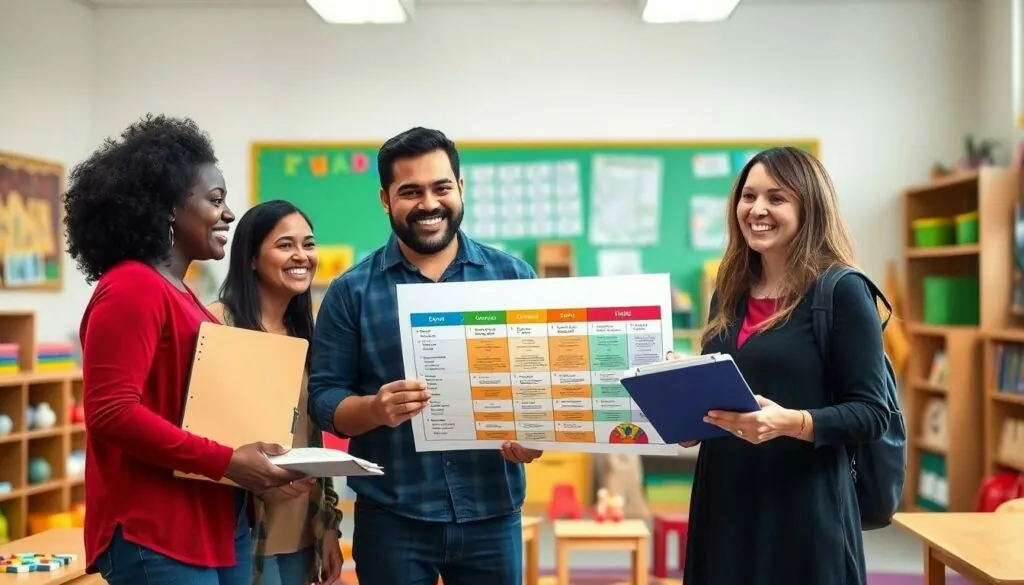Imagine stepping into a room full of tiny humans, armed with the knowledge to nurture their potential. Sounds like a superhero gig, right? Getting your Child Development Associate (CDA) certification isn’t just a badge of honor; it’s your ticket to transforming lives, one crayon at a time.
Table of Contents
ToggleUnderstanding Child Development Associate Certification
Child Development Associate (CDA) certification serves as a foundational credential for those working with young children. This certification signifies commitment to nurturing children’s potential and equipping individuals with essential skills.
Importance of CDA Certification
CDA certification plays a critical role in enhancing early childhood education. This credential establishes a standardized benchmark for professionals in the field. Individuals with this certification demonstrate proficiency in areas such as child development and caregiving. Standards are set by the Council for Professional Recognition, ensuring recognized quality across the industry.
Benefits of Obtaining CDA Certification
Obtaining CDA certification offers numerous advantages for early childhood educators. This credential increases job market competitiveness, making applicants more appealing to employers. Career advancement opportunities often arise for those with CDA certification. Professionals may also benefit from access to a wider network of resources and support. Additionally, the certification fosters a deeper understanding of child development principles, ultimately enriching educational practices.
Eligibility Requirements

To obtain Child Development Associate (CDA) certification, candidates must meet specific eligibility requirements. Understanding these criteria ensures a smooth application process.
Educational Background
Candidates require a high school diploma or equivalent. Completion of 120 hours of formal early childhood education training is essential. Courses often cover child development, health, safety, and nutrition. Additionally, programs must include hands-on experiences. This educational foundation prepares individuals for practical challenges in early childhood settings.
Experience in Child Care
Candidates need to demonstrate at least 480 hours of work experience in child care within the past five years. This experience typically involves direct supervision of children in settings like preschools or daycare centers. Hours should highlight active engagement with children aged birth to five years. Quality experiences help candidates apply learned concepts and address developmental needs effectively.
Application Process
Applying for Child Development Associate (CDA) certification involves several key steps and required documents. Understanding these elements helps streamline the journey to certification.
Steps to Apply for CDA Certification
First, individuals must complete the required formal early childhood education training. Completing 120 training hours across various relevant subjects is essential. After this, they should gather proof of their experience, demonstrating at least 480 hours of work in child care within the last five years. Next, candidates need to select a suitable assessment resource agency for application submission. Submitting the application online is the next step. Lastly, preparing for the CDA exam by reviewing study materials ensures readiness.
Required Documentation
Documentation requirements start with proof of educational achievement, like a high school diploma or equivalent. Candidates must also provide transcripts for their completed training hours. Work experience verification forms that detail the 480 hours spent in child care are necessary. Additionally, a signed professional philosophy statement reflects the candidate’s understanding of child development. Finally, an application fee payment ensures processing can occur without delays.
Preparing for the CDA Assessment
Preparation for the CDA assessment involves utilizing the right study resources and practice exams for success.
Study Resources
Candidates should explore various study resources to ensure thorough knowledge of early childhood education concepts. Books, online courses, and official CDA preparation guides serve as foundational materials. The Council for Professional Recognition website provides essential resources, including recommended reading lists and study outlines. Additionally, local libraries and community colleges often have curriculum-related materials and workshops. Utilizing these resources helps candidates understand critical topics such as child development, health, safety, and nutrition. Engaging with peer study groups can also enhance learning through discussion and collaboration.
Practice Exams
Practice exams play a crucial role in CDA exam preparation. They familiarize candidates with the exam format and types of questions encountered during the assessment. Many educational websites offer free or low-cost practice exams that simulate real test conditions. Understanding the timing and complexity of questions allows for effective time management on exam day. Candidates should review their incorrect answers to identify areas that require further study. Regularly taking practice exams boosts confidence and readiness, making it easier to address any weak points before the actual assessment.
Maintaining Your CDA Certification
Maintaining Child Development Associate certification requires ongoing commitment and effort. Certification holders must keep their skills current through a structured process.
Renewal Process
A CDA certification remains valid for three years. To renew, individuals must complete a renewal application, which involves documenting professional development activities and submitting proof of 48 hours of continuing education during the certification period. Gathering verification forms, transcripts, and a renewal fee streamlines the process. Candidates must also complete a signed professional philosophy statement that reflects their growth over time. Engaging in this renewal process demonstrates a dedication to professional standards in early childhood education.
Continuing Education Requirements
Continuing education plays a vital role in maintaining CDA certification. Certified individuals must complete 48 hours of professional development every three years. This education can occur through workshops, seminars, or online courses relevant to child development, health, safety, and nutrition. Programs should align with the core competencies set forth by the Council for Professional Recognition. Individuals also gain additional insights from networking opportunities, conferences, and courses in specialized areas like diverse learning or special needs. Prioritizing education enhances skills and knowledge, ultimately benefiting the growth of children in their care.
Earning a Child Development Associate certification opens doors to a fulfilling career in early childhood education. It empowers individuals to make a lasting impact on young lives while enhancing their professional skills. The journey involves meeting specific requirements and committing to ongoing education, ensuring that certified professionals remain knowledgeable and effective.
By obtaining this certification, individuals not only boost their job market competitiveness but also join a network of dedicated professionals. The continuous learning process enriches their understanding of child development, ultimately benefiting the children they serve. Taking the steps to achieve CDA certification is a significant investment in both personal and professional growth.








